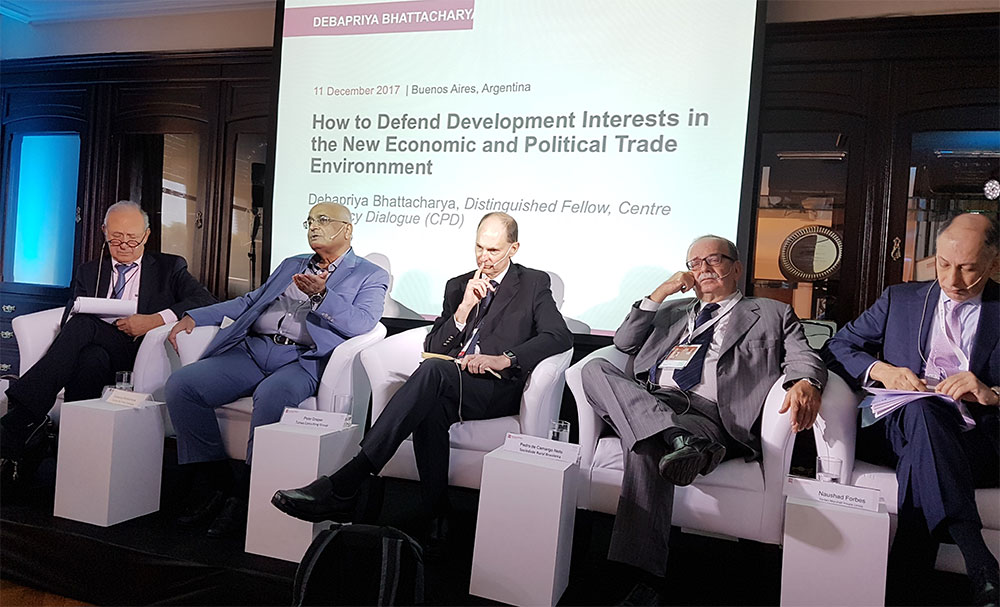
A Centre for Policy Dialogue (CPD) delegation which included two senior professionals, Dr Debapriya Bhattacharya and Professor Mustafizur Rahman, recently attended the Trade & Sustainable Development Symposium (TSDS) which was held on the sidelines of the Eleventh Ministerial Conference of the World Trade Organization (MC11) on 10-13 December 2017 in Buenos Aires, Argentina. The symposium was an opportunity for the CPD professionals to highlight issues of interest and concern for the Least Developed Countries (LDCs) in view of the MC11. Since CPD is the host of the LDC IV Monitor and Southern Voice, the symposium provided the CPD professionals with an opportunity also to stress the point that the multilateral trading system ought to work in achieving the Istanbul Programme of Action (IPoA) targets and the Sustainable Development Goals (SDGs).
At the session on How to Defend Development Interests in the New Economic and Political Trade Environment, Dr Debapriya Bhattacharya, Distinguished Fellow, CPD, stressed the point that given the ongoing changes in the global landscape in part arising out of protectionist trends of various types (e.g. Brexit, growing populism, ‘Trump phenomenon’ among others), the Special and Differential Treatment (S&DT) aspects at present ‘remains totally out of focus’ of the multilateral trading system. With reference to the theme of the discussion, he commented that the issue of defending development interests goes beyond the issues of differentiation and market access, and should concern policy space, supply-side capacity building and North-South inter-relationship. Dr Bhattacharya also noted that, indeed the huge amount of subsidy given to the agricultural sector by the developed countries speaks of a reverse S&DT favouring the developed WTO members.
He shed light on the transformative, universal, inclusive, and integrated nature of the SDGs and 2030 Agenda for Sustainable Development, and emphasised that the SDGs have spoken of a global vision where multilateral trading system was to play a critically important role in helping low-income developing countries achieve the SDGs. Dr Bhattacharya stressed that one of the key missing links was trade which should be integrated with Vision 2030.
Dr Bhattacharya cautioned that recent developments such as the quorum-less dispute settlement panel, refusal to pursue WTO’s Doha Round agendas and obstructionist postures by particular powerful members do not argue well for the multilateral trading system and the WTO. A serious rethinking about the focus, institutional architecture and decision-making process may be required to salvage the WTO.
Professor Mustafizur Rahman, Distinguished Fellow, CPD, attended two sessions at the TSDS 2017. At the session on Towards Inclusive and Sustainable Rules of Origin (RoO), Professor Rahman concentrated on the challenges the LDCs are facing in meeting the RoO requirements and reform opportunities. He highlighted specific concerns with regard to the three types of RoO in place that LDCs have to comply with regarding preferential market access. He also addressed the tension between RoO and the need for structural transformation in the LDCs in his presentation. Professor Rahman also critically examined the Bali WTO MC9 decision regarding RoO. Finally, he suggested some reforms to make the RoO LDC-friendly by taking the Canadian preferential scheme as a model.
While speaking at the session on Services Waiver: Maximising LDC Benefits, Professor Rahman underlined a number of points including the growing importance of services trade in the global economy and why this has emerged as an area of interest for the LDCs, and servicification of manufacturing trade. He also critically analysed the Offer List submitted by 25 WTO members and the Request list submitted by Nepal on behalf of the LDC group. He emphasised on the need for proper homework if the waiver’s potential benefits are to be taken advantage of. Professor Rahman recommended a number of steps that the offering countries should take to enable the LDCs to be able to realise the market access in services of their interest. These included flexibility in terms of economic need test, degree equivalence, LDC-specific market access quota and support to strengthen supply-side capacities of the LDCs in services sector areas. He also emphasised the need for the LDCs to undertake the needed homework to enhance domestic capacities to take advantage of the services waiver.



